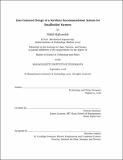User-centered design of a fertilizer recommendation system for smallholder farmers
Author(s)
Mallareddy, Nikhil.
Download1111801578-MIT.pdf (5.500Mb)
Other Contributors
Massachusetts Institute of Technology. Institute for Data, Systems, and Society.
Technology and Policy Program.
Advisor
Chintan Vaishnav.
Terms of use
Metadata
Show full item recordAbstract
Declining soil health is a major problem in India, affecting nearly 120 million hectares of land constituting 37% of the total geographic area. Soil degradation poses a significant threat to India's food security, due to its negative impact on long-term crop yields, which are crucial for feeding a burgeoning population. Imbalanced fertilizer use, a negative consequence of the Green Revolution, is one of the primary causes of soil degradation and adversely impacts the environment, human health, and farm profitability. The problem can be addressed by adopting the principles of site-specific nutrient management (SSNM), which call for judicious use of fertilizer based on frequent soil testing. However, inadequate soil testing capacity and lack of access to information act as barriers to its adoption. This project aims to facilitate adoption of SSNM by developing a point-of-use soil testing and nutrient management system, made up of two key components 1) an affordable, point-of-use sensor that enables on-farm soil testing and 2) a recommendation engine that provides actionable fertilizer advice through mobile phones. This thesis presents the design of the fertilizer recommendation engine, by answering the following research question: "How to implement actionable fertilizer recommendations, in order to maximize adoption by resource-constrained farmers?" In doing so, it represents the second phase of the project, building on the actionability framework laid by done by fellow researcher, Soumya Braganza. This thesis mainly focuses on the issues involved in the implementation of the recommendation engine, through a "user centered approach" adopting diverse methods such as stakeholder interviews and conjoint analysis. In order to answer the question of customization, data from the conjoint study was analyzed, revealing the influence of farmers' behavioral factors on actionability. In order to realize the level of customization required, a Bayesian algorithm was proposed to generate recommendations suited to a farmer's behavior. Thereafter, lessons from field studies were consolidated into system requirements for the fertilizer recommendation engine, and methods were proposed to address them. Lastly, a layered architecture is presented to implement the desired features of the recommendation engine in an integrated manner.
Description
This electronic version was submitted by the student author. The certified thesis is available in the Institute Archives and Special Collections. Thesis: S.M. in Technology and Policy, Massachusetts Institute of Technology, School of Engineering, Institute for Data, Systems, and Society, 2018 Cataloged from student-submitted PDF version of thesis. Includes bibliographical references (pages 67-70).
Date issued
2018Department
Massachusetts Institute of Technology. Institute for Data, Systems, and Society; Massachusetts Institute of Technology. Engineering Systems Division; Technology and Policy ProgramPublisher
Massachusetts Institute of Technology
Keywords
Institute for Data, Systems, and Society., Technology and Policy Program.